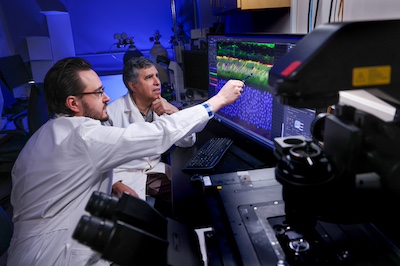OPHTHALMIC GENETICS
The Ophthalmic Genetics team at Duke is dedicated to a tripartite mission of patient care, education, and research. We offer a comprehensive clinical care approach, dynamic research programs, and a one-year clinical fellowship to train more specialists and future leaders in inherited retinal diseases. Our overarching goals include:
- Provide world-class clinical care for individuals and families suffering from inherited retinal diseases.
- Discover important new knowledge about gene mutations which cause blindness.
- Develop novel therapies that can treat or cure hereditary blindness.
- Improve retinal imaging modalities to achieve earlier and more accurate diagnosis in children.
- Train the next generation of specialists in inherited retinal diseases
Patient Care
The Duke Center for Ophthalmic Genetics is a premier destination for the diagnosis and treatment of hereditary and congenital ocular conditions, offering modern diagnostics, treatments, and surgical interventions. The Ophthalmic Genetics team consists of expert clinicians, including specialists in the diagnosis and management of inherited retinal diseases and vitreoretinal surgeons with advanced expertise in delivering gene therapy medications.
Our state-of-the-art diagnostic facility includes the full range of retinal imaging instrumentation and functional vision testing. We have a comprehensive retinal electrophysiology suite, where patients undergo sophisticated testing, such as electroretinography (ERG), to measure the ability of the retina to detect light. The clinical team is supported by a dedicated genetic counselor working with patients and their families to uncover their diagnoses through specialized genetic testing.
As a recently Certified Center of Excellence for Luxturna, Duke is the only Luxturna treatment center between Philadelphia and Miami for patients on the East Coast of the U.S.
Education
The Duke Inherited Retinal Degenerations Fellowship program is a comprehensive one-year training experience designed to immerse ophthalmologists in the captivating world of ophthalmic genetics. Our program offers unparalleled training in both pediatric and adult cases, ensuring a well-rounded exposure to the full spectrum of inherited and congenital ocular conditions, with a particular emphasis on inherited retinal degenerations. Fellows will acquire the expertise needed to diagnose and manage these diverse and intricate conditions.
Learn more about the IRD Fellowship program.
Research

Discovering New Treatments for Inherited Retinal Diseases
The Duke Eye Center has one of the most impactful retinal research programs in the nation, spanning from scientific knowledge-building to translational research in drug development. Many of our investigators are internationally recognized for their work and lead promising research programs that offer hope to patients afflicted with hereditary blinding conditions. Our researchers are supported by federal, foundation and industry funding.
The Duke Center for Innovative Treatments of Retinal Degenerations integrates, facilitates, and expands the audacious efforts of our researchers. We use a vigorous translational research pipeline, whereby ideas generated in laboratories and clinics are converted into the development of novel therapies. In this pipeline, new discoveries are evaluated in blind animals first, followed by a streamlined process of designing and testing new therapeutics, with the ultimate goal of advancing the most promising candidates to clinical trials. Duke Ophthalmology is fortunate to have a broad range of expertise and access to state-of-the-art resources within the Department and across the Duke University campus.
Retina Imaging Research
Early and accurate diagnosis of inherited retinal diseases is crucial for ensuring proper management of these conditions and opening the doors to potential clinical trial participation. However, diagnosis is often delayed in young children, due to the technical limitations of performing sophisticated imaging in this population. Ophthalmic Genetics specialists at Duke collaborate extensively with the Duke Department of Biomedical Engineering to develop and implement cutting-edge imaging modalities that allow for unprecedented quality and speed of visualizing retinal anatomy in children. This work not only improves our diagnostic capabilities but also provides new insight into our understanding of what happens to the retina during the earliest stages of these conditions.
Clinical Trials
The Duke Eye Center participates in a broad range of clinical studies, including industry-sponsored interventional trials and foundation-supported natural history studies. Our goal is to convert today’s promising research developments into tomorrow’s therapies for patients suffering from inherited retinal diseases.
View clinical studies currently underway at our Clinical Research Unit
The expertise is in place at the Duke Eye Center to make great strides in combatting inherited retinal degenerations to improve the quality of life for future generations. Funding is essential to continue our groundbreaking research that will hopefully one day cure blindness for people with inherited retinal degenerations.
Thank you for considering a secure, online donation! To learn about other ways to donate, please contact Ari Gauss, Senior Director of Development for Duke Eye Center, ari.gauss@duke.edu or 919.385.3128.


